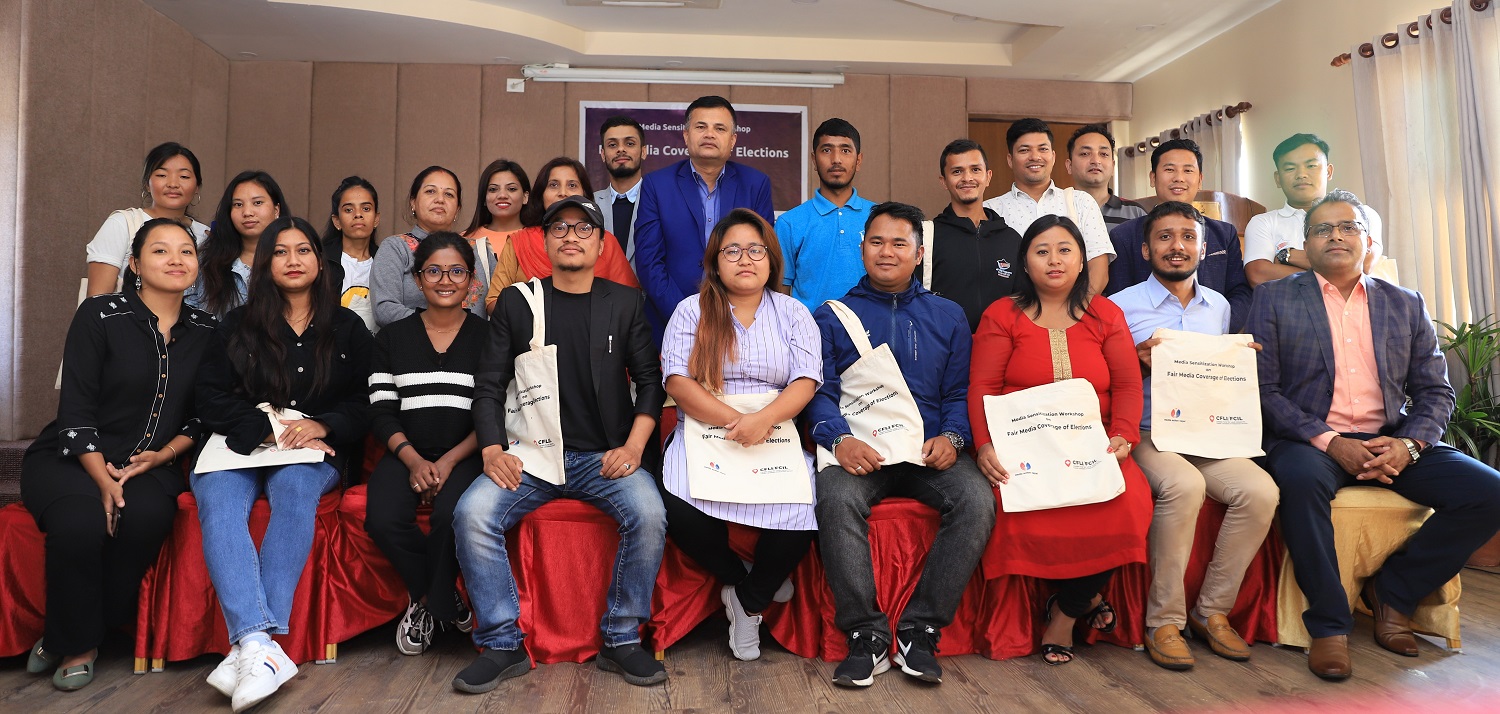
175 journalists sensitized on fair media coverage of elections
KATHMANDU/October 30: As the country is gearing up for the November 20 elections, Media Action Nepal, a member and Co-chair of the Media Freedom Coalition-Consultative Network (MFC-CN) sensitized a total of 175 working journalists through seven separate workshops on fair media coverage of the elections. These workshops were aimed at promoting ethical journalism as well as countering disinformation towards an inclusive and independent media, which is considered critical to guaranteeing free, plural and fair elections.

Supported by the Canada Fund for Local Initiative (CFLI), the seven separate media sensitization workshops have been concluded in Hetauda of Bagmati province, Janakpur of Madhesh province, Dhangadhi of Sudurpaschim province, Surkhet of Karnali province, Butwal of Lumbini Province, Biratnagar of province 1 and Pokhara of Gandaki province from September 28 to October 21, 2022.
These workshops covered topics such as professional standards and code of conduct for journalists, media approach to human rights, countering hate speech, and promoting inclusive news content. A total of 175 journalists, half of them women, have been benefitted from the workshop held by Media Action Nepal and with CFLI’s funding in the headquarters of all seven provinces.
Hetauda, Bagmati Province
Focused on developing an understanding of the participants on election code of conduct for media and journalism professionals, these workshops saw an enthusiastic and interactive participation of 50 working journalists including 22 women. The workshop organized in Hetauda of Bagmati Province on September 28 was attended by a total of 25 participants from Hetauda and Chitwan districts. Out of which 12 participants were women. The participants represented eight newspapers, five television channels, six online news portals and six radio stations.
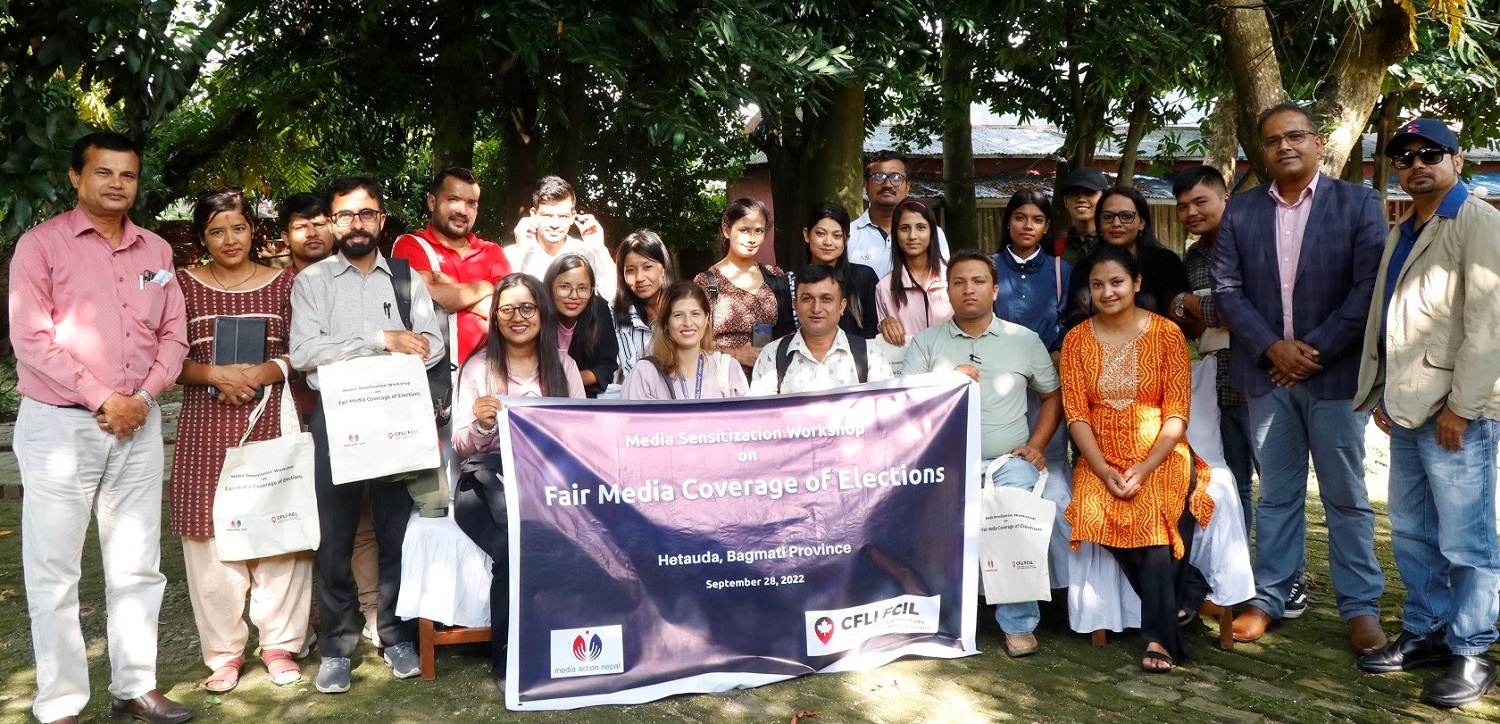
Meanwhile, Srijana Nepal, a participant from Radio Thaha Sanchar in Makawanpur shared, “As the training was right before the election, it was helpful to us to learn about the roles the media should play before, during and after election.” Similarly, Shanta Adhikari, a journalist working with Chitwanpatra commented, “Receiving the training before the election provided us an understanding on subjects that need to be focused during election like the political parties and candidates, the issues and the voting process.”
Janakpur, Madhesh Province
Similarly, the sensitization training in Janakpur on September 30 was second in the series and witnessed the participation of 25 journalists including 10 women from Dhanusha, Sarlahi, Mahottari and Siraha districts.
Organized ahead of the federal and provincial elections of Nepal taking place on November 20, the training workshops with three sessions, covered topics of professional standards and code of conduct for journalists, media’s approach to human rights and approaches to countering hate speech and promoting inclusive media content. These sessions in both locations were facilitated by Laxman Datt Pant, Global Journalism Trainer and Chairperson of Media Action Nepal and the Co-Chair of MFC-CN, Shree Adhikari, Human Rights Expert and Priyanka Jha, Vice-Chairperson of Media Action Nepal.
Pant interacted with the participants focusing on standards for fair media coverage of elections, elections and media professionalism, adherence to ethics and code of conduct and understanding diversity and media’s role in elections. He also focused on election’s code of conduct for journalists published by the Election Commission Nepal (ECN) that is being implemented from 28th September, 2022 until the federal and provincial elections scheduled for November 20, 2022.
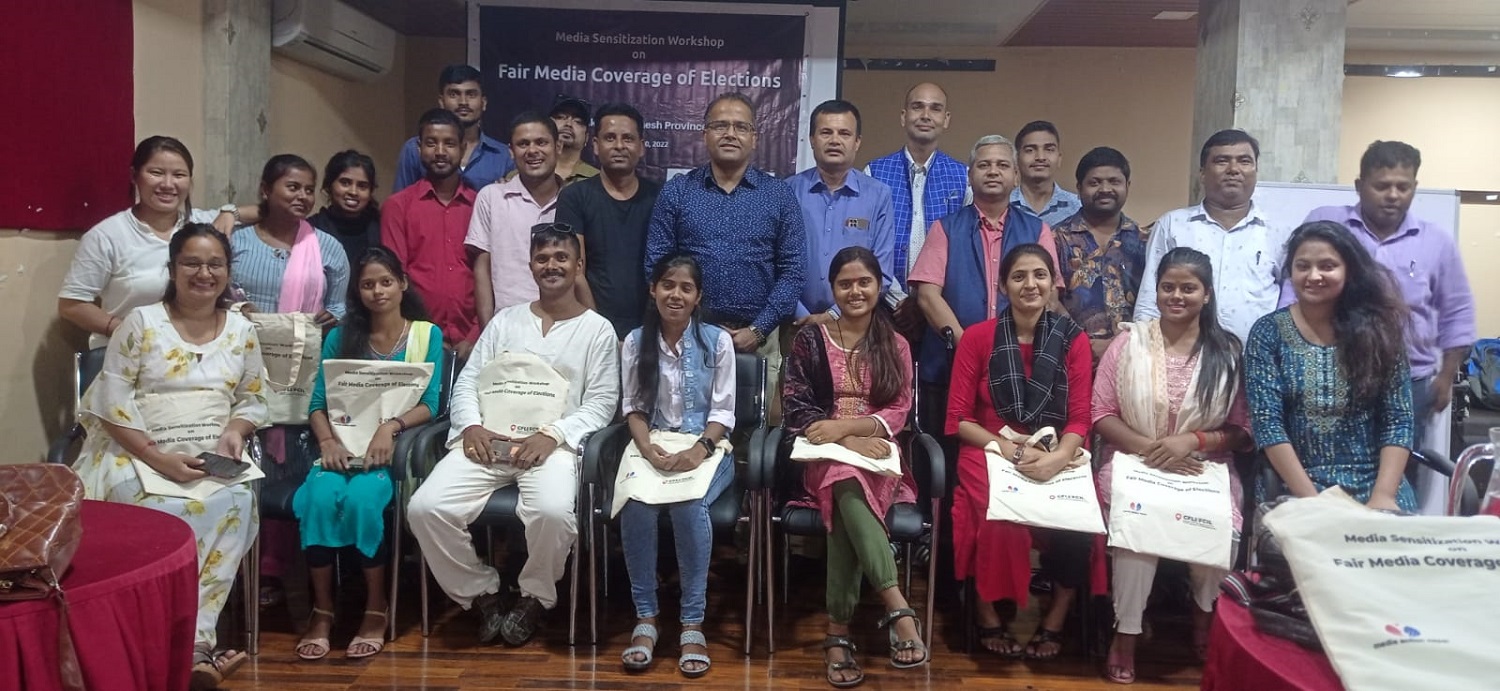
Adhikari focused on areas of human rights and election-provision and standards, constitution of Nepal, stages of reporting in election, media’s approach to human rights reporting. He discussed the laws related to election and the laws that need to be considered while reporting elections. His discussion also included the importance of fair media coverage during three phases of election i.e before election, during election and after election. Jha shared with the participants about understanding elections related misinformation/disinformation and hate speech, issues for media advocacy and promoting inclusive media content. She focused on the importance of the role and responsibilities of journalists and media during the election.
Likewsie, Mukesh Kumar Thakur, a participating journalist in Janakpur said, “The training was the need of the time as the election is close. I am thankful to Media Action Nepal for providing us information about the election code of conduct for journalists and reminding us about the responsibilities and duties of journalists while covering the upcoming elections.” Next five training workshops each in Province 1, Lumbini, Gandaki, Karnali and Sudurpashchim provinces are taking place from October 12 to 21, 2022.
Dhangadhi, Sudurpashchim Province
Inclusive and independent media can promote democratic participation, voters’ literacy and interaction between political parties and people. Therefore journalists must stay away from spreading mis- and disinformation as well as hate speech.
Such a voice came during a workshop organized in Dhangadhi on October 11 on fair media coverage of the upcoming elections. A total of 25 journalists of Sudurpaschim Province participated in the event, the third in series ahead of the federal and provincial elections organized by Media Action Nepal with support from the Canada Fund for Local Initiative (CFLI).
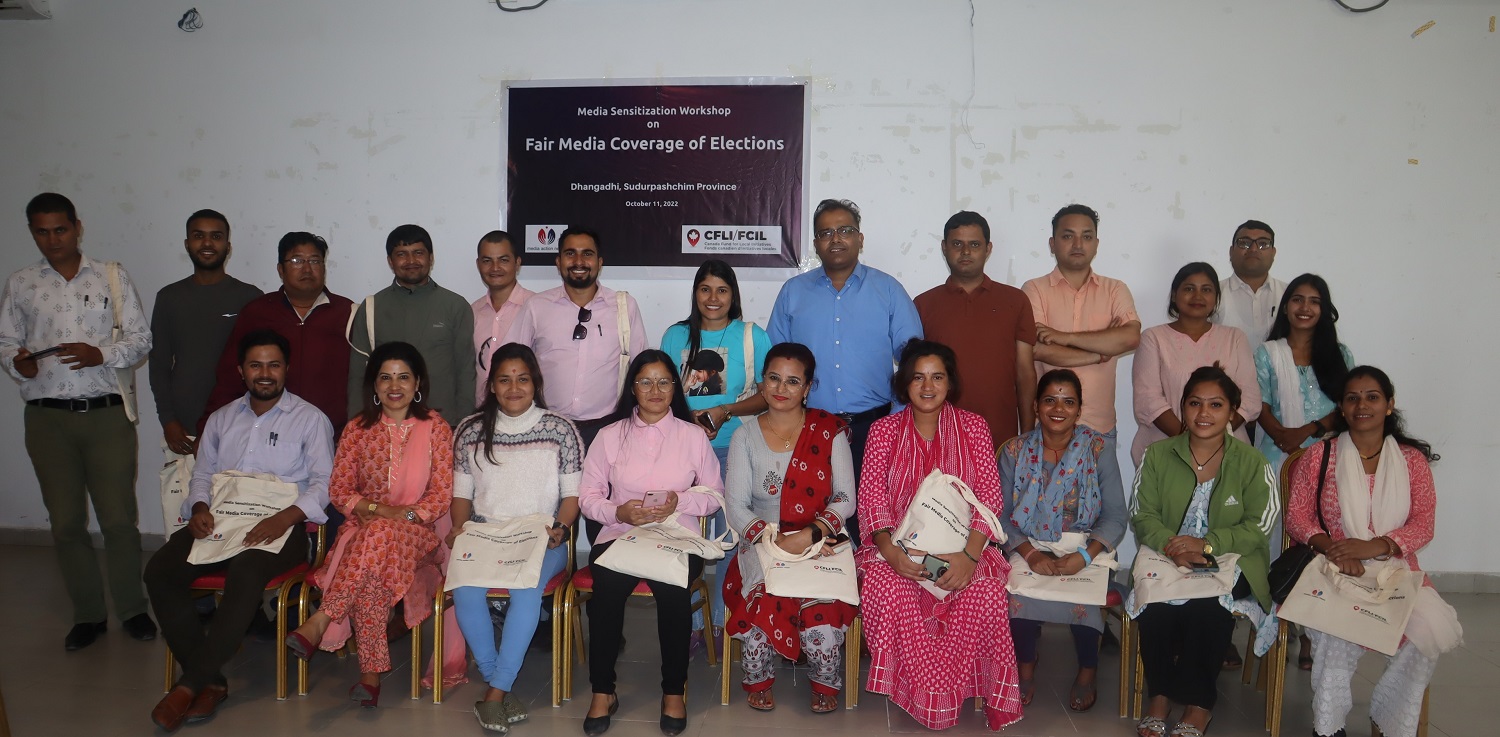
“Journalists must adhere to ethical practices, fairness and accuracy in the time of elections or during normal circumstances. Failure to do so has ramifications for everyone,” said Chairperson of Media Action Nepal Laxman Datt Pant while inaugurating the workshop. He was one of the facilitators of the event.
Similarly, another facilitator of the workshop and Editor of The Himalayan Times Rajan Pokhrel said, “Media persons must provide election-related information to the public and write news stories reflecting pluralistic views of the society and distinguishing between facts and opinions.”
Another session of the workshop was on gender-sensitive reporting. “Maintaining accuracy and impartiality while writing news stories of women politicians and highlighting under-representation of women as electoral candidates is the duty of every journalist during the elections,” noted Editor of Health TV Online Kalpana Acharya.
Journalists act as defenders of human rights. They are gatekeepers of dis/misinformation. Thus it is essential to thoroughly check and verify information through fact-checking measures and disseminate accurate and verified news stories.
One of the participants of the workshop, Chadani Acharya who works for the state-run Gorkhapatra daily, said she was delighted to attend a workshop ahead of the elections. “The event helped me realize the critical role of journalists during the elections. During the time of election media persons are expected to side with certain political ideologies and rally for them. The workshop was a wake-up call for journalists to distance from political campaigning and maintain a neutral role throughout the election.” Her voice was echoed by other participating journalists.
As the country is gearing up for the November 20 elections, the CFLI-funded workshop is being held in all seven provinces, with three already completed, with an aim at promoting ethical journalism and journalistic code of conduct as well as countering disinformation towards an inclusive and independent media, which is key to strengthening human rights and democracy.
Surkhet, Karnali Province
Underscoring that biased media reporting can undermine the integrity of elections, acclaimed media advocate and researcher Laxman Datt Pant called on media persons to produce accurate, unbiased and credible news stories and to adhere to the journalistic code of conduct during the upcoming federal and provincial elections.
Pant, Chairperson of Media Action Nepal, said this at a workshop organized in Surkhet, Karnali Province, on October 13 on fair media coverage of the upcoming elections. “Journalists have a critical role in ensuring trust among all stakeholders during the time of elections. Thus facts and evidence – not rumours – should guide election reporting,” noted Pant, who is one of the co-chairs of the Media Freedom Coalition-Consultative Network, a global forum of civil society organizations that provide advice to the member states of the Media Freedom Coalition.
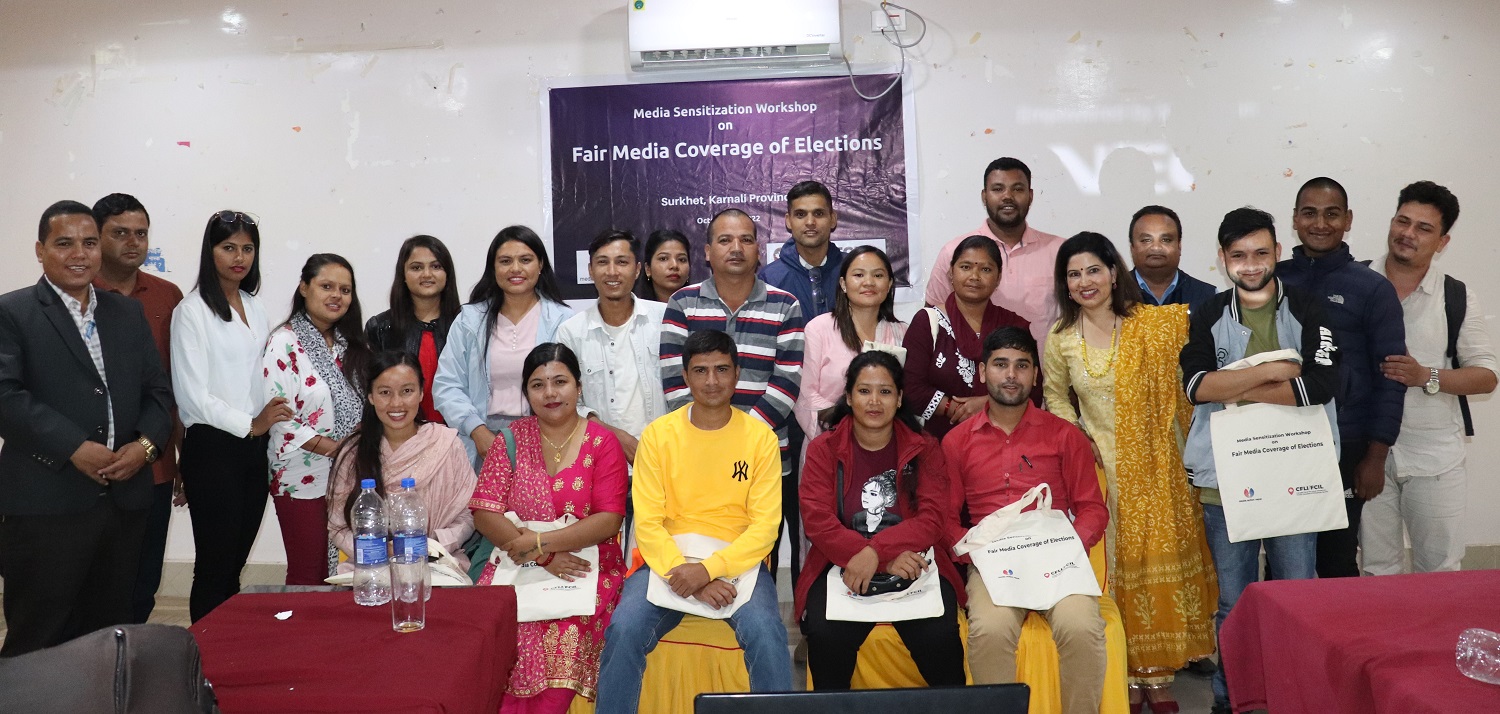
A total of 25 journalists of Karnali Province participated in the event, the fourth in a series ahead of the federal and provincial elections organized by Media Action Nepal with support from the Canada Fund for Local Initiative (CFLI).
Meanwhile, Pant expressed serious concern over the move of the Election Commission to establish a “Press Office” with representatives from the Nepali Army and Nepal Police to monitor election-related social media materials and news coverage by newspapers, TVs, radios and online media. “Such decision is against the principles of press freedom,” he said.
Another facilitator of the workshop and Editor of The Himalayan Times Rajan Pokhrel said, “Voting is a human right. The upcoming election is an opportunity for journalists to fairly report on any issues that undermine the right to vote and freedom of expression.”
Similarly, Editor of Health TV Online Kalpana Acharya said, “Media ethics and the guidelines developed by the Election Commission are a great tool to fight the spread of disinformation and empower voters with accurate, truthful and non-biased information.” They must be upheld by journalists in letter and spirit, she noted.
Butwal, Lumbini Province
As the election fever is slowly gripping the country, media experts have called on journalists to abide by ethical standards and give proper space to genuine concerns of voters.
“Free and fair election reporting contributes to public understanding. Therefore, media persons must avoid partisan reporting,” said Chairperson of Media Action Nepal Laxman Datt Pant at a workshop organized in Butwal, Lumbini Province, on October 15 on fair media coverage of the upcoming elections.
“Be it in the time of elections or during normal circumstances, the perennial mantra is accuracy, balance and credibility,” he said, adding that journalists should adhere to the standards of ethical reporting to promote inclusive content.
Another speaker at the event, Editor of Annapurna Express Kamal Dev Bhattarai, noted that media have a role to question the authority to safeguard citizens’ rights to vote. The upcoming elections is an opportunity for journalists to promote plural voice, he added.
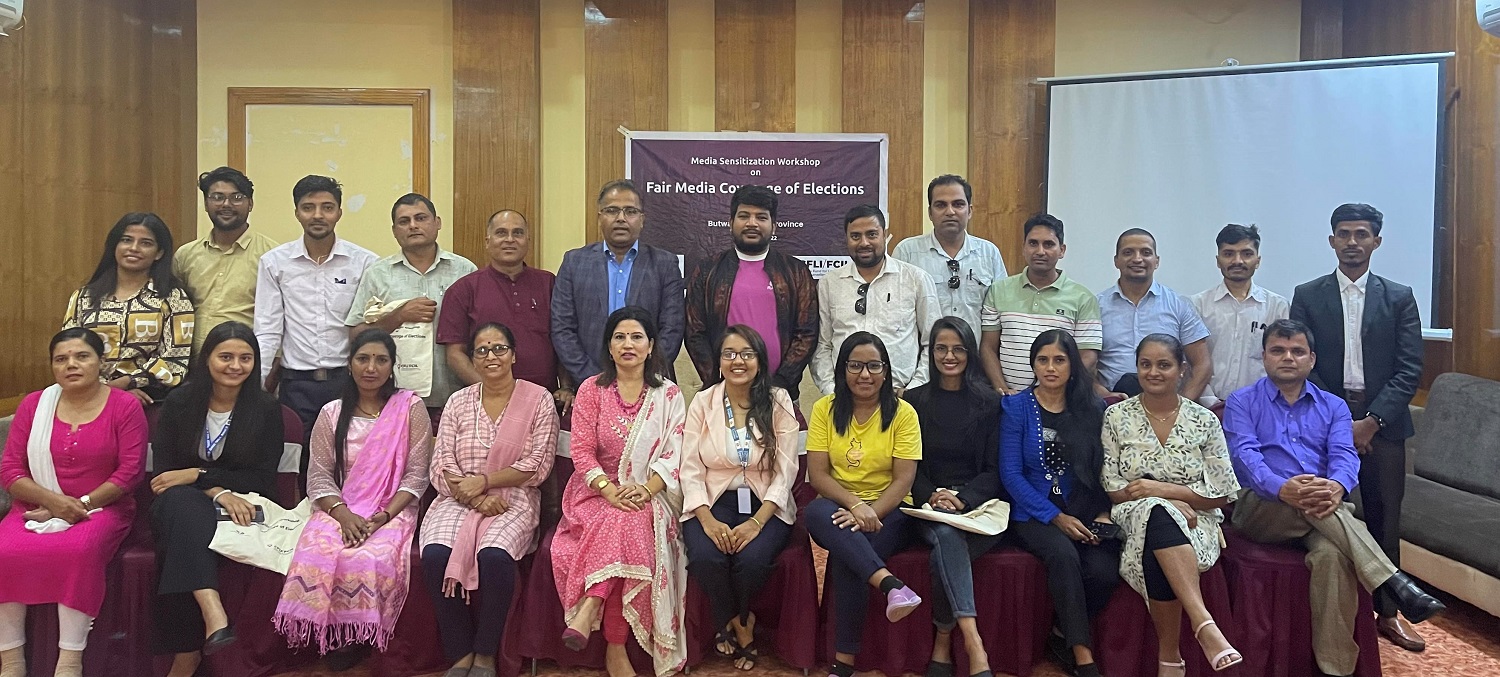
Similarly, Editor of Health TV Online Kalpana Acharya, another facilitator of the workshop, said journalists have a great role in making elections free, fair and inclusive. “For this to happen, there must not be any scope for media sensationalism.”
A total of 25 journalists of Lumbini Province attended the workshop, the fifth in a series ahead of the federal and provincial elections organized by Media Action Nepal with support from the Canada Fund for Local Initiative (CFLI). As the country is gearing up for the November 20 elections, the workshop is being held in all seven provinces with an aim at promoting ethical journalism and journalistic code of conduct as well as countering disinformation to promote free, plural and fair elections.
Biratnagar, Province 1
Ahead of the federal and provincial elections scheduled for November 20, experts and media persons in Biratnagar discussed the role of media in making the upcoming elections free and fair.
The workshop on fair media coverage, the sixth in a series, organized on October 18 covered topics like professional standards and code of conduct for journalists, media’s approach to human rights and countering hate speech and promoting inclusive media content.
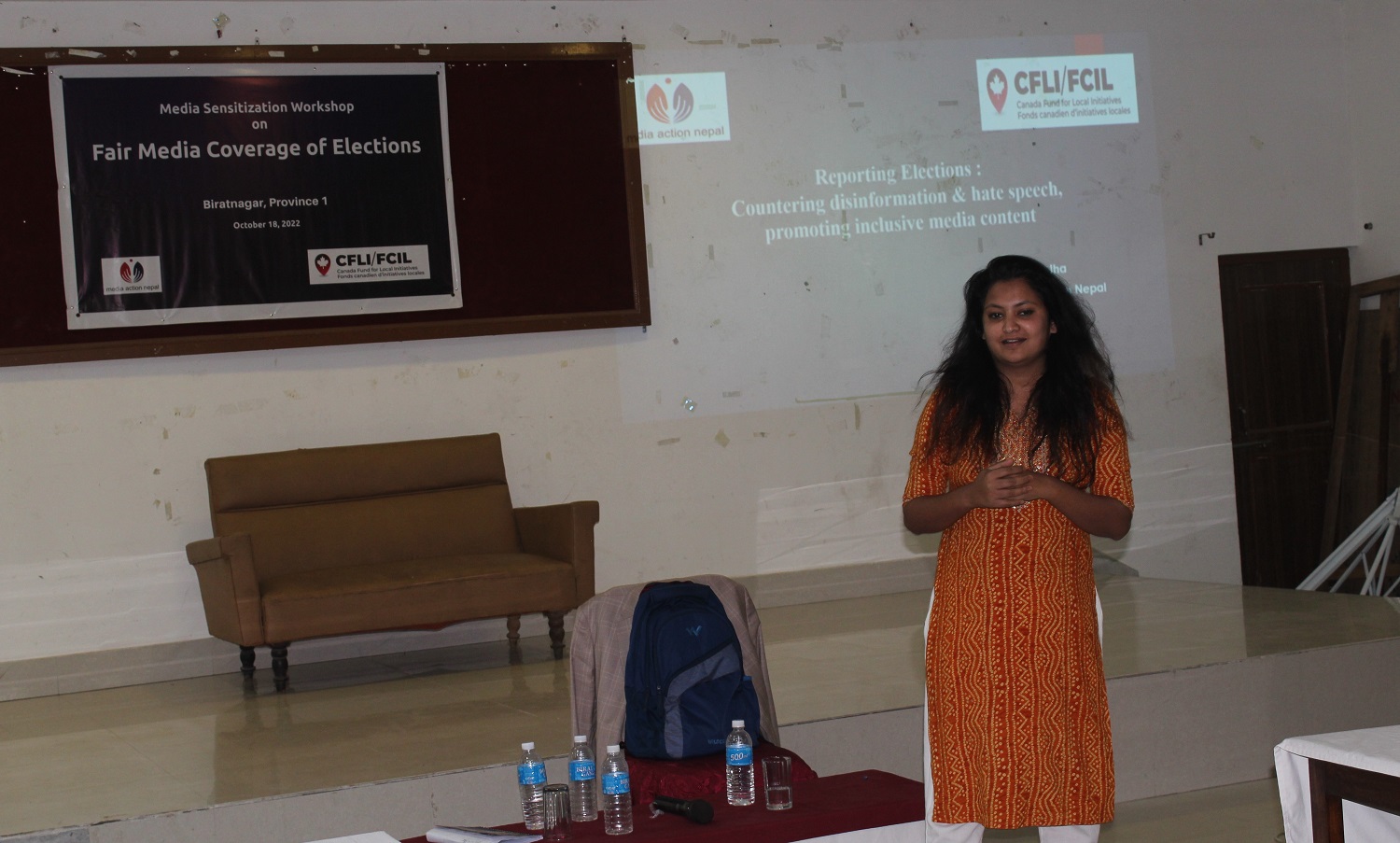
Global media expert and chairperson of Media Action Nepal Laxman Datt Pant, Chief Officer of Press Council Jhabindra Bhusal, media trainer Yam Bahadur Dura and Vice-Chairperson of Media Action Nepal Priyanka Jha facilitated the workshop attended by 25 journalists from Sunsari, Jhapa and Morang.
Highlighting ethical journalism, Pant stressed on the need for disseminating credible information and facts in a timely manner, verifying information from news sources, and giving adequate space to different candidates in the fray representing different political parties. If media or journalists are carrying out a polling during the elections, the right methodologies must be applied to and they should be clearly defined, he said.
Similarly, Bhusal stated that there arises a situation wherein news sources must be protected by not disclosing their identity for their safety and security. However, journalists should not use this freedom to disseminate baseless and false information, he said.
Stating that the role of media is also to stick to human rights provisions, media expert Yam Bahadur Dura urged journalists to differentiate between fundamental rights and human rights. His presentation focused on the special features of the Universal Declaration of Human Rights.
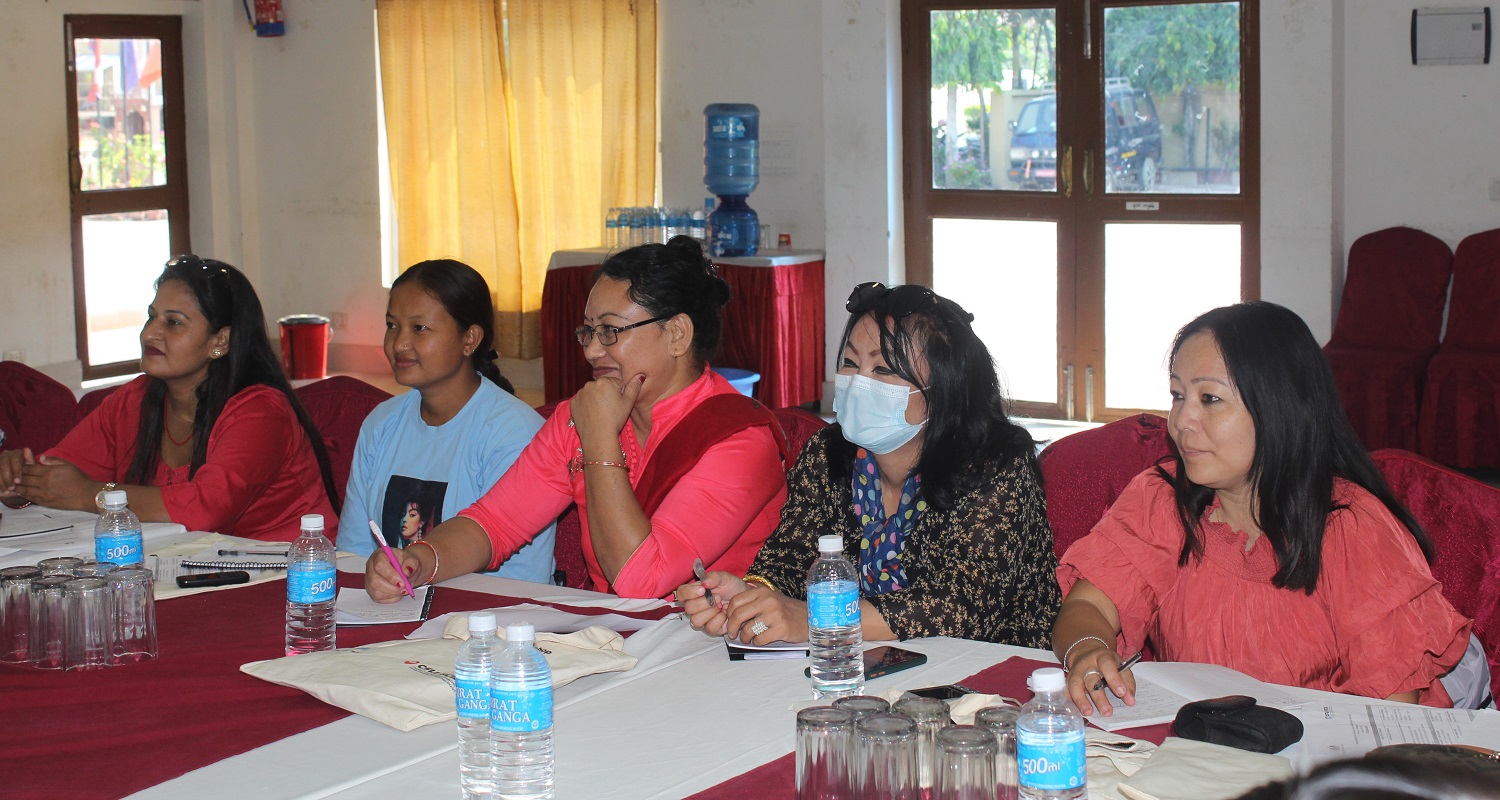
Likewise, Jha focused on gendered disinformation and its intent to silence and embarrass people who are already at risk such as women and marginalized communities.
Out of the total participants, 15 were female journalists and 10 were male. Two journalists from Province 1 will receive a fellowship based on their commitment and performance in election reporting.
Pokhara, Gandaki Province
As the battle to outfox electoral opponents has raged on across the country, experts have called on journalists to counter misinformation and hate speech to ensure free and fair polls.
“Media persons have a vital role to play to ensure free and fair elections as they are responsible for facilitating free flow of information to help people make informed choices about which party and leader to vote for,” said Chairperson of Media Action Laxman Datt Pant speaking at a workshop in Pokhara on October 21. He said that journalists must be vigilant as political parties and leaders are trying to influence them in their favour to have an advantage over opponents.
Speaking on the occasion, Chairperson of the Kaski chapter of Federation of Nepali Journalists Bimala Bhandari urged journalists to meet public expectations during the elections through fair reporting and practice objective, impartial and balanced journalism every day.
Secretary of Media Action Nepal, Ganesh Ghimire said, “Journalists must remind the government of its obligations to uphold human rights protected by Nepal’s constitution as well as those provisions set out in the international human rights treaties.”
At the event, human rights expert SB Chhetri shared how media persons can contribute to ending disinformation and hate speech in a world dominated by social media.
Rina Thapa, a Pokhara-based journalist and one of the participants of the workshop, said she will be working on writing more stories of deprived communities to highlight their voices and promote participation in the upcoming federal and provincial elections.
